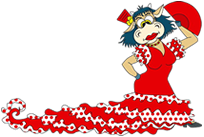Alejandro Moreno Vera. Born in Malaga, in 1982, his family is linked to the flamenco. At 16 years he begins with the master Pepe Satorre.
Now he is working in solo and he joins the "toque" with the singing accompaniement and dancing.
-
-
Andrés Cansino, born in Malaga in October 1971. At nine years old he learned with different teachers and he decided to learn alone until he's got sixteen, when he performed for the first time on stage.
He published twelve records, he is a classical guitarist. He took some masterly classes with Manolo Sanlucar in the "Festival Internacional de la Guitarra de Córdoba". -
Andres Segovia Torres. Marquis of Salobreña, born in Linares (Jaen) in 1893 February 21. and died in Madrid in 1987 June 3. because of a heart attack, with 94 years.
Son of a humble carpenter. His father sent him to his uncles house to have a better economic position. He should become a chemist but he learned the guitar alone and in secret.
During this period the guitar was an underestimated instrument, considerated the gypsy instrument par excellence, not an "educated" music.
His first master was a flamenco barber, very good playing guitar. During his adolscence he studied at the Musical Institute of Malaga.
In 1909, with 16 years old, offered his first concert in Granada.
Andrés considers that his first debut was in 1913, in Madrid, with 20 years old. He had to rent a good guitar for this concert as his instrument wasn't appropriate.
During the competition "Cante Jondo" celebrated in Granada in 1922, arranged by Manuel de Falla and Federico Garcia Lorca with the participation of Andrés Segovia, is born the friendship between Segovia and Don Francisco Prieto-Moreno Pardo, great achitect and lover of the Herradura in Almuñecar. We can find a maritim walk with his name there.
He also played in the theater Liceo in Barcelona, and then he performed in Paris and London in 1924. He was 31 and he was already tge best guitarist on earth. In 1928 he made hsi debut in the United States.
His first records are from 1927, he has a big importance in the music world of the XX. Century. Thanks to him the guitar became an instrument like others. Great composers created music for that instrument. Due to the civil war of 1937 he left Spain for Uruguay until 1947. He worked with guitar manufacturers to design the classical guitar, with quality woods and nylon strings. The shape of the guitar has also been modified.
The key of his success will be the great sonority that he was able to reproduce with his guitar. Andrés Segovia get married three times along his 94 years of life. The two first times he became widower and his third wife, Emilia del Corral, Emilita, was 45 years younger and accompanied him until the last day of his life.
The king of Spain gave him, in 1981, the title of Marquis of Salobreña.
The City Council of Linares, his native city, installed a big clock (with the initials of the Master and the silhouette of his guitar). When the clock marks the hours you hear an extract of his work "Estudio sin luz". -
Antonio Carrión Jiménez, also known as "Antonio Carrión" or "EL Niño Carrión".
Born in Mairena del Alcor in Sevilla, in 1964. His family is coming from a great flamenco tradition, son of the cantaor "Carrión de Mairena" who teached him the first tones and flamenco compas. With thirteen years old he recorded his first work. He is also grandnephew of the cantaor "Cancuna", firend of "Juan Talega", "Antonio Mairena".
His toque, which pretends balance the most traditional forms with the most innovator trends, plants his roots in schools like the one of "Melchor de Marchena" or "Niño Ricardo" among other artists.
He also performed in French festivals, in Bordeau and Mont de Marsan, but also in Düsseldorf, Bruxelles, Amsterdam, Alexandrie, Bruges, Berlin, Genève et Rome. -
Antonio López Arenas, also known as "Antonio Arenas", born in Ceuat in 1929, March 15. and died in Madrid in 2008 on October 28.
His father was Francisco Lopez Cacao "Carrion de Mairena", and his mother Adela Arenas Romero; grandnephew of the cantaor "Cancuna".
Antonio Arenas grew up with flamenco, at his father home he learns about flamenco, and with 13 years old he recorded for the first time. Conchita Piquer, Manolo Caracol, Manolo el Malagueño and Juan Valderrama are the first ones to help him.
He was the first "tocaor" in "La Villa Rosa" of Madrid and then performed in tablaos and particular parties.
He was the first to accompany Camaron de la Isla on a disc. After that he went to Argentina for six months, then he came back to Madrid. In "El Corral de la Moreria" he will work for 5 years.
In the 60s he get sick and to help him and collect moeny the artists payed a tribute to him in "El Circo Price".
Along his career he accompanied a lot of cantaores like "El Almendro" "Elu de Jerez", "La Macanita", "Tina Pavón", "Pansequito", "José Mercé", "José Menese", "Chano Lobato", "Chocolate", "Vicente Soto", "Rancapino", "Carmen Linares", "Camaron de la Isla" "Alejandro Sanz" or "El Lebrijano" among others. He also worked a lot of years for the different tablaos in Madrid. He gave classes and conferences about flamenco until his last days. -
Antonio Soto Arjona, also known as "Antonio Soto", born in 1966, December 2. in Barcelona. Coming from a flamenco family from Malaga. Among his family: "La Pirula" and "La Cañeta".
With 14. he started his tour around the Arabic Emirats and Jartum in Sudan, with Juana Ximenis, disciple of Carmen Amaya. In 1982 he worked in tablaos "Los Tarantos", "El Cordobes" and "La Venta del Gato" in Madrid. In 1983 he worked as a guitarist for Antonio Salas, first dancer for the Antonio Gades company.
From 1985 he is the official guitarist of the "Torre del cante" Peña in Alhaurin de la Torre, in Malaga. He also accompanied Jose Merce, Camaron de la Isal, Aurora Vargas and other great artists.
Now he is the guitarist of the master Antonio Fernandez Diaz "Fosforito" and of the cantaor Manuel de los Santos "Agujetas". His last artistic presentation was the recording of a CD calle "Pa'er teto".Awards:
1992: Premio Nacional de Guitarra en Alhaurín de la Torre.
2001: Premio Nacional de Córdoba, accompaniment "Juan Habichuela"
2002: 1er. Premio Bordón Minero Festival Internacional del Cante de las Minas de La Unión Murcia.












